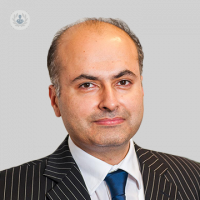Musculoskeletal radiologists: how do they help with sports injuries?
Written by:Musculoskeletal (MSK) radiologists are trained specialists who diagnose conditions affecting the bones, joints and soft tissues, which may have occurred as the result of a sports injury or due to osteoarthritis of the joints, such as in the knee.
We spoke to leading musculoskeletal radiology consultant Professor Waqar Bhatti about what MSK radiologists do exactly and how he can personally assist you if you are suffering from a sports injury.

What is musculoskeletal radiology and imaging?
The exciting field of musculoskeletal radiology helps clinicians such as orthopaedic surgeons, general practitioners, rheumatologists, physiotherapists, chiropractors and podiatrists in the radiological diagnosis of the joint and soft tissue disorders such as osteoarthritis and tendinopathy and in acute soft tissue and sports injuries.
As musculoskeletal radiologists, we are able to accurately assess joints, tendon and soft tissue problems using a number of safe techniques such as X-rays, ultrasound, MRI examination and CT examination to formulate an accurate diagnosis which allows for the best management plan.
I am able to assist in relieving pain by offering steroid injections, relieving stiffness through high volume saline injection for stiff shoulder and tendon and help regeneration of soft tissues by utilising platelet-rich plasma (PRP) and newer stem cell treatments.
How does MSK radiology assist in sports?
As a sports radiologist, I am able to utilise my 20 years of musculoskeletal radiology experience in the diagnosis of sports injuries.
As a senior MSK radiologist, I provide musculoskeletal radiology cover to a number of premiership teams in my locality of Manchester, British cycling, Lancashire county cricket teams, local rugby teams and a host of Olympic teams based in Manchester.
The launch of The Football Clinic in Manchester is the first multidisciplinary-based approach in the assessment, diagnosis and management of football-related injuries and the musculoskeletal radiologists play a central role through radiological diagnosis in guiding management and can provide interventional techniques such as soft tissue and joint injections.
A number of regenerative therapy treatments such as PRP treatments are offered as well as steroidal, hyaluronic acid and glucose (prolotherapy) injections.
Do MSK radiologists work closely with other sports health professionals?
In modern medicine, a team-based approach is essential for the best outcomes. The musculoskeletal radiologist works very closely alongside:
- orthopaedic surgeons;
- physiotherapists;
- rheumatologists;
- podiatrists, and;
- chiropractors.
This is via personal case discussions and formal regular multi-disciplinary meetings where the radiologist is central to the discussion. It allows us to provide the best evidence-based standard of healthcare we pride ourselves in.
What are the benefits of seeking help from an MSK/sports radiologist?
As a musculoskeletal radiologist with 20 years of experience, I am able to guide clinicians, directing them to the best imaging for the evaluation of soft tissue tendon and joint disorders that their patients may have. Most clinicians shall have direct access to their friendly neighbourly radiologist. With the vast experience I have, I am also able to discuss and guide the best management options.
As a professor in sports radiology at Manchester Metropolitan University I'm able to share my experience with colleagues through formal teaching and assessment leading to a diploma as well as train the next generation of sports radiologists working alongside me in my team.
If you would like Professor Bhatti’s specialist care and expert advice in your case, you can book an appointment with him via his Top Doctor’s profile.


